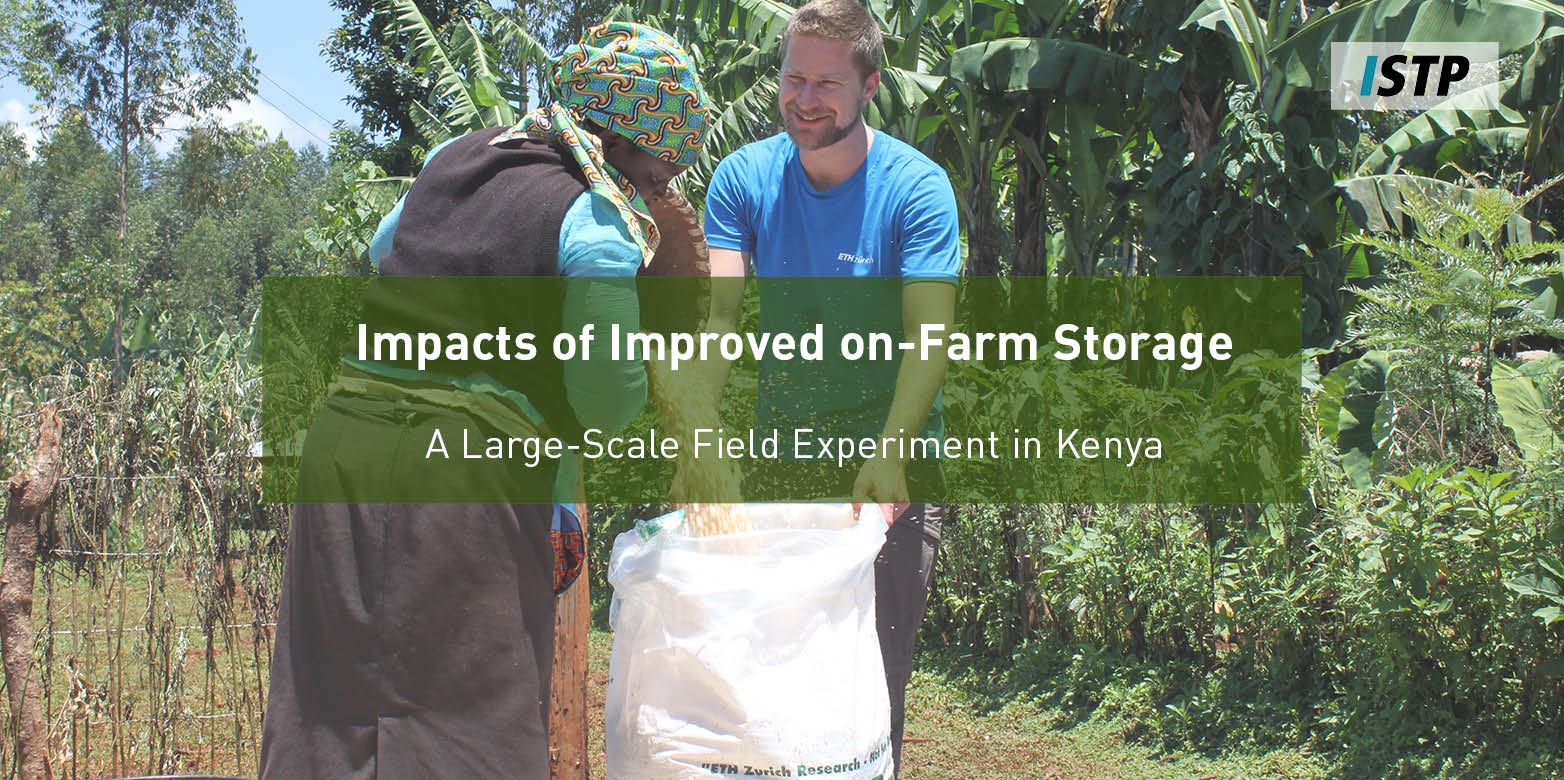Impacts of Improved on-Farm Storage
A Large-Scale Field Experiment in Kenya
Project details
ETH Team: Prof. Dr. Thomas Bernauer, Dr. Matthias Huss & Dr. Michael Brander
Focus country: Kenya
Project partner(s):
- external page University of Zurich (Prof. Dr. Ulrike Ehlert & Heike Eichenauer)
- external page International Centre of Insect Physiology and Ecology (Dr. Menale Kassie & Dr. Tadele Tefera)
- external page United Nations World Food Programme (WFP)´s Global Post-Harvest Knowledge and Operations Center (Alex Businge)
- external page Helvetas Swiss Intercooperation (Dr. Martin Fischler)
- external page Swiss Agency for Development and Cooperation
Further Advisor(s):
- Brett Rierson (Executive Director Harvest Agriculture Solutions; former Head of the external page UN World Food Programme’s Global Post Harvest Knowledge & Operations Centre)
- Simon Zbinden (Co-Head Global Programme Food Security, external page Swiss Agency for Development and Cooperation)
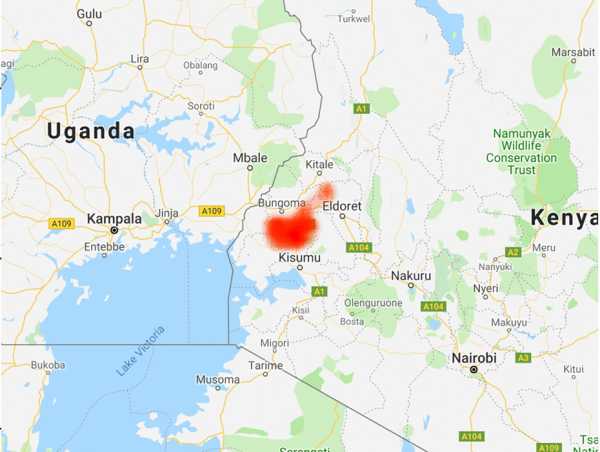 Farmers in Kakamega County during a training session on improved on-farm storage. As part of the experimental intervention, farmers groups randomly allocated to participate in a standardized training session. (Photo: Michael Brander / ETH Zurich)
Farmers in Kakamega County during a training session on improved on-farm storage. As part of the experimental intervention, farmers groups randomly allocated to participate in a standardized training session. (Photo: Michael Brander / ETH Zurich)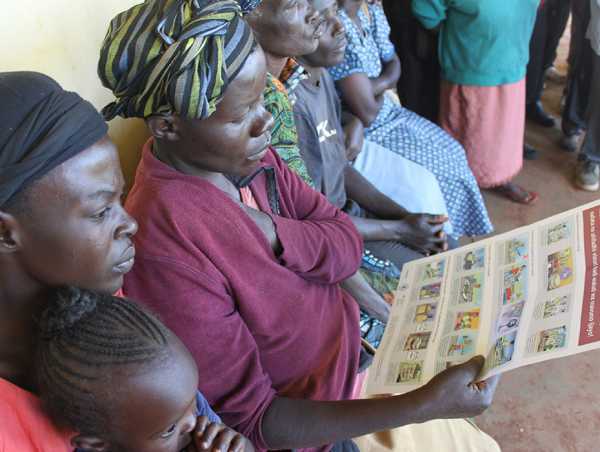 High frequency data through SMS-based mobile phone surveys. Household stocks and local market prices are measured weekly, and food security and income monthly. (Photo: Michael Brander / ETH Zurich)
High frequency data through SMS-based mobile phone surveys. Household stocks and local market prices are measured weekly, and food security and income monthly. (Photo: Michael Brander / ETH Zurich) Additional data is collected through face-to-face surveys and on-site. ETH researcher Dr. Matthias Huss in conversation with a farmers. (Photo: Michael Brander / ETH Zurich)
Additional data is collected through face-to-face surveys and on-site. ETH researcher Dr. Matthias Huss in conversation with a farmers. (Photo: Michael Brander / ETH Zurich)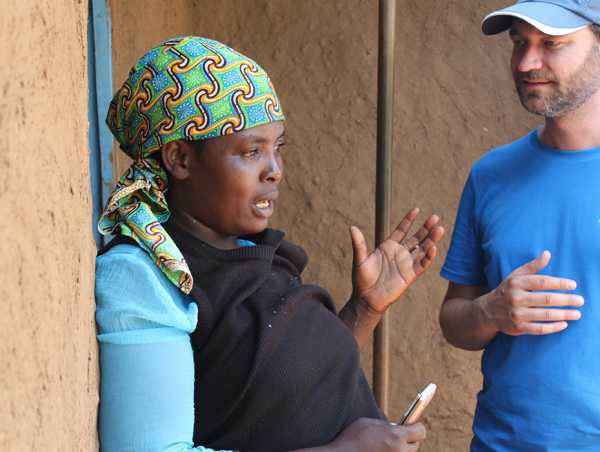 Farmers allocated to treatment receive 5 hermetic storage bags. Picture shows a smallholder farmer in Kakamega County filling her new hermetic storage bag together with ETH researcher Dr. Michael Brander. (Photo: Michael Brander / ETH Zurich)
Farmers allocated to treatment receive 5 hermetic storage bags. Picture shows a smallholder farmer in Kakamega County filling her new hermetic storage bag together with ETH researcher Dr. Michael Brander. (Photo: Michael Brander / ETH Zurich)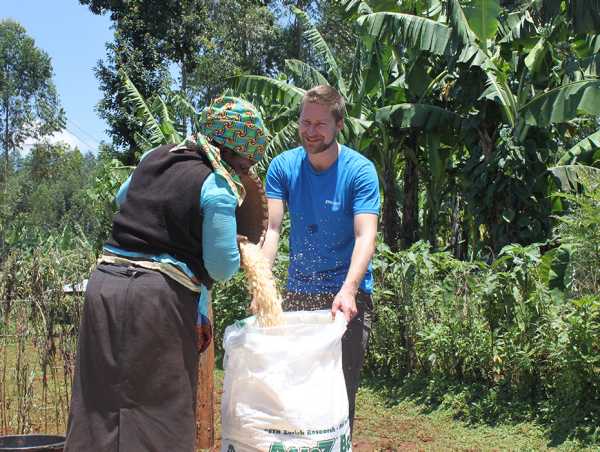 Hermetic storage bags limit atmospheric oxygen, which causes desiccation of insects and other pests that damage stored grains. (Photo: Michael Brander / ETH Zurich)
Hermetic storage bags limit atmospheric oxygen, which causes desiccation of insects and other pests that damage stored grains. (Photo: Michael Brander / ETH Zurich)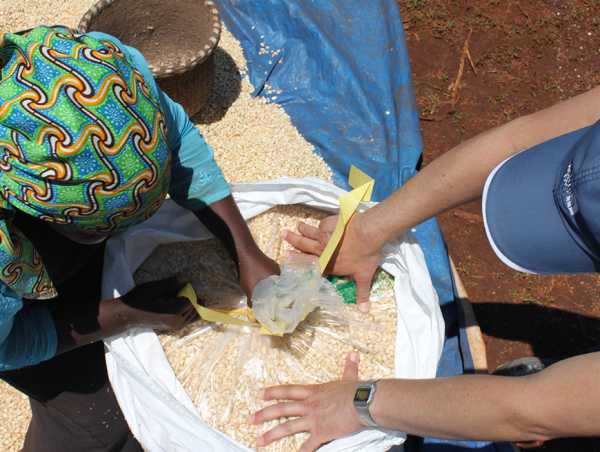
Project description
Nourishing a growing world population in ecologically sustainable ways is one of the main goals of the United Nations’ 2030 Agenda for Sustainable Development. Current efforts prioritize increasing agricultural production, whereas reducing food waste and losses, including post-harvest losses, receives much less attention in policy-making. This bias is problematic, as hermetic storage bags, for instance, provide a simple and affordable means of preserving the quantity and quality of harvested food.
Hermetic storage limits atmospheric oxygen, which causes desiccation of insects and other pests that damage stored grains. Hermetic storage bags could thus, in principle, curb post-harvest losses and allow farmers to store their produce longer. This, in turn, could improve food security, food safety and incomes without putting additional pressure on natural resources, notably in poor areas of the world dominated by smallholder farming and high levels of food insecurity. However, as yet, the literature on human welfare impacts of post-harvest loss reduction is scarce and there is virtually no systematic empirical research on the implications of these technologies for a wide range of crucial outcomes.
This project addresses this research gap and analyses the effects of improved on-farm storage on smallholder farmer’s welfare, in particular their a) income, poverty, and food security and b) nutrition and human health, with a focus on pregnant women and newborns. To analyse these effects, a large-scale Randomized Control Trial (RCT) in Western Kenya, involving a sample of ~8.000 smallholder farmers, was implemented. The randomly allocated intervention are five hermetic storage bags per smallholder farming household, with a capacity of 100kg of maize per bag, and a standardized training session on their use.
In a complementary project (Adopt2Adapt), enabled through the ETH4D Research Challenge, we extend this analysis to consider the potential of hermetic storage to support smallholder farmers in adapting to the income, food security, nutrition and human health impacts of climate change. In this regard, we analyse whether improved storage reduces the adverse effects of yield fluctuations on smallholder farmers welfare.
For all outcomes of interest, data is collected over the course of two years (i.e., four harvest seasons) through SMS-based mobile phone surveys, which is an efficient and effective method to collect data at high frequency. In addition, on-site visits will be used to collect:
- detailed nutrition and health data for pregnant women and their newborns, and
- grain samples to analyse quantitative and qualitative storage losses, and aflatoxin contamination.
These on-site visits will take place in randomly selected sub-samples of the study population.
The multi-disciplinary research team includes researchers in Switzerland (ETH Zurich; external page University of Zurich), a research institute in Kenya (external page icipe), and NGOs/IGOS specialized in rural development (external page Helvetas; external page UN World Food Programme’s Global Post Harvest Knowledge & Operations Centre). The project results will be used to inform development programmes as well as national, regional and global policies aimed at improving livelihoods and food security of smallholder farmers.
Outcome 1: Analysis of the effects of improved crop storage in smallholder agriculture on hunger, nutrition, poverty and health among 8'000 households
Farmers from 8'000 households in West Kenya signed up for our research project (66% women farmers). Participants received frequent SMS-based surveys to track food prices in local markets, storage, buying and selling behaviour in participating households, as well as household food security. Upon completion of an SMS survey, participants received an airtime top-up as an incentive. In addition to these economic and food security data, additional data capturing nutrition and health indicators as well as health-related epigenetic changes, were collected through on-site visits with pregnant women and their newborns.
Outcome 2: Training in preventing post-harvest losses and equipping over 3'000 households with hermetic harvest bags.
Randomly selected groups of farmers underwent post-harvest loss prevention training and received hermetic crop storage bags. To support the training, the team developed a standardized training manual and posters with simple visualizations. As part of the field intervention, 4'060 farmers took part in the training; of these, 3'531 farmers were eligible to receive hermetic harvest bags (as registered study participants).
Outcome 3: Media work and events in international policy forums to exchange and publish scientific findings.
The research and results were presented in various public and policy fora. Among others, the research was presented at the 3rd All Africa Post-Harvest conference hosted by the African Union Commission (AUC), at an SDC-hosted workshop in Arusha, at a WFP conference in Khartoum, at ETH Science City, and in the Museum Mühlerama. Additionally, the team shared regular briefings with key experts involved in the global response to the emerging food price and food security crises following the war in Ukraine. Furthermore, the project resulted in media coverage in Schweizer Radio SRF1, Radio Voice of America (starts min. 5:10), Deutsche Welle Radio Kiswahili Service (starts min. 12:05) and ETH News. One journal article from the project is already published in «Global Food Security».
Outcome 4: A basis for decision-making concerning measures to promote improved harvest storage.
In a publication co-authored with the team's partner organizations, the team conducted an initial analysis to shed light on the evolution of food security during the COVID-19 restrictions in Kenya and the role of hermetic crop storage during this time («Global Food Security»). The results of the analysis showed that at the beginning of the COVID-19 restrictions in Kenya, the food security situation in the project region had worsened. However, households that benefited from improved crop storage as part of the project were less affected by food insecurity - despite COVID-19 restrictions. The data collection will continue beyond the end of the current project phase, and further reports for publication will be developed. As key team members (M. Huss & M. Brander) acquired additional funding, the project in Kenya will be expanded and complemented with a new project on on-farm storage in Tanzania. As both team members have moved from ETH Zurich to the University of Zurich in mid-2022, these expanded research activities will be implemented by the University of Zurich.
